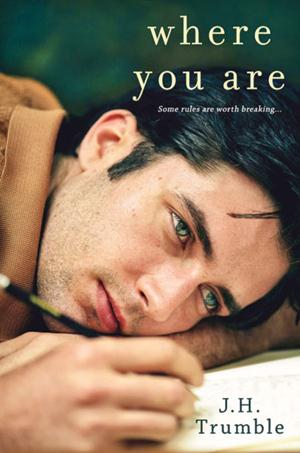Some rules are worth breaking.
For 24-year-old high-school math teacher Andrew and his 17-year-old student Robert, love couldn’t wait.
Andrew is struggling to discover his identity as a gay man after a failed marriage to the woman he sort of inadvertently got pregnant. Robert is wrestling with resentment for his dying father, secretly wishing for the cancer to finally win so he can be free from the binds of urine-filled bedpans. Searching for solace and support, he turns to his teacher.
With only four months to go until Robert’s graduation, the star-crossed lovers try to resist their connection, with little success. It quickly becomes obvious to both student and teacher that as long as their hearts beat, they can’t deny what’s in them.
“I didn’t write Where You Are to romanticize a forbidden relationship,” author JH Trumble says. “I wrote it to explore how a good man, a good father, a good son, a good friend, a good teacher could find himself caught up in a scandal. I wanted to explore what it would take for someone like that to cross an immutable line.”
Once that line is crossed, many questions arise, none of which have black or white answers. The novel references a Texas law that imposes up to 20 years in prison for a teacher convicted of having sex with a student, regardless of the student’s age. The law is based on the idea that teachers have power over their students and that engaging them in intimate relationships is an abuse of that power. But as seen in the dynamic between Andrew and Robert, that isn’t always the case.
“I have a son who, like Robert, is a senior in high school,” Trumble says. “He’s old enough to enter into legal contracts, old enough to be held accountable as an adult in the legal system, old enough to go to war. He’ll always be my baby, but he is not a child. The differential of power in the student/teacher relationship is very real, and there should be rules to protect that relationship, and consequences when it’s breached. But to make criminals out of consenting adults is wrong in my opinion.”
“Should they have waited? Of course. Is Andrew a pedophile? No.”
As a public school librarian, Trumble is all too familiar with the unrelenting standards teachers are held to and how that oppression can affect and even ruin lives.
“In public school, there are lots of little things that happen all the time where we find we have to explain ourselves over something totally innocent,” Trumble says. “We had an incident a couple years ago where we had an email that was being forwarded all over the district, and it was photos of a bunch of little kids doing hilarious, adorable things. One of them was three little boys and they were shot from the back, peeing in a flower bed. The principal was charged with having child pornography on her computer because of that photo. Here they show this photo on the six o’clock news and act as if it’s representative of what’s on her computer, and it was just total nonsense. It was just a stupid photo that was getting forwarded! It’s a world that I’m very familiar with, and I just wanted to explore the way these things happen. They’re not always what they look like on the six o’clock news.”
So is there hope for relationships like Andrew and Robert’s, in a world with people quick to vilify and persecute teachers for feelings that, under other circumstances, would be socially accepted? Trumble thinks so.
“I have a really good friend who’s probably in his 60s now. He was a high school teacher, and he fell for one of his senior cheerleaders while he was a teacher,” she says. “Shortly after she graduated he asked her out, and they now have three grandchildren.”

 Why you can trust Xtra
Why you can trust Xtra


